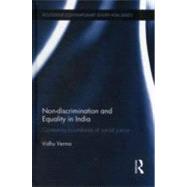- ISBN: 9780415677752 | 0415677750
- Cover: Hardcover
- Copyright: 11/29/2011
Social justice has been the animating ideal of liberal democracies in the 20th century. It is a concept familiar to most Indians but one whose meaning is not always understood as it signifies a variety of government strategies designed to enhance opportunities in employment, education and political representation for underprivileged groups. Existing theories proposed by many political philosophers to explain social justice have failed to capture the way people think about these issues in India. Independent India has always tried to present a unified face to its diverse ethnic, religious and social groups and eliminates caste discrimination through legislation. But caste-based prejudices still exist as a blot on the world#xE2;#xAC;"s largest democracy and its progressive, liberal constitution. Aware that categories and definitions have changed over the years, the Indian government has just taken a decision to enumerate a caste census for the first time since 1931 to help target quota benefits. Although critics say the move will only reinforce caste identities and breed inequity, others are hopeful that it will help disadvantaged groups. The debate between the two camps has been governed by the assumption that the only alternative to the present scheme is a menu of exclusive categories based on caste. To see why this is a contentious and difficult stance it will be helpful to explore the ethical and policy issues surrounding the quota or reservation policies in India. By raising some of these issues and by providing a rich historical background to see them in context, this proposed manuscript examines the evolution of multiple conceptions of social justice in India







